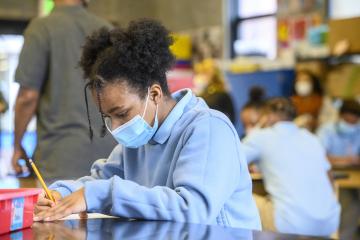This past spring, the Henderson-Hopkins School found itself with an extra 85 students on campus: Twice a week, 55 undergraduate and 30 graduate students from Johns Hopkins University would travel to the East Baltimore public school to serve as math tutors for grades four through eight.
The Henderson-Hopkins Math Tutorial Program first started in fall 2022, with 53 tutors serving nearly three-fourths of all eligible students. Since then, the initiative has grown exponentially, with about 40 Hopkins tutors resuming their roles this fall and plans to hire an additional 60 tutors for the upcoming school year.
The idea for the program first arose during a visit to the school by JHU President Ron Daniels. While speaking to Henderson-Hopkins Principal Peter Kannam, Daniels asked what could be done to address learning losses caused by the pandemic.
"I said, 'I would set up a way to engage Johns Hopkins students and bring them in to tutor our students in math," Kannam recalled. "And President Daniels said, 'Let's make it happen.' That's the kind of person that President Daniels is."
According to the first cohort of tutors, each visit with their Henderson-Hopkins students follows the same routine: After arriving in Lyfts provided by the university, tutors go inside to meet their groups, which are made up of two to three students. Then, after a few minutes of catching up, the lessons begin, with each student receiving personalized attention as they review math concepts and complete practice problems. Some weeks also have special themes, such as Culture Week, where students and tutors were encouraged to share parts of their heritage with each other.
One aspect that makes this tutoring program different from past Henderson-Hopkins initiatives is the timing. Rather than keeping the students after school or requiring them to come in early, tutoring occurs during the school day, slotted between the students' other learning blocks. By structuring the day like this, the program can better retain its college-age tutors, who often have other commitments outside of school hours. As a result, students receive more consistent instruction and support.
According to Charlotte Egginton, a Krieger School junior majoring in the Writing Seminars, maintaining reliable tutors also allows for deeper connections within the program.
"I saw so many examples of extremely positive relationships forming between the students and tutors," she said. "Part of my duty as a tutor was not just to do the math problems and solve the equations but to listen to [my students] when they needed someone to confide in. Because we're younger, we have the opportunity to form a close connection like that."
Liz Jenkins, the program's manager, described the arrangement as a win-win for both students and tutors. While the Baltimore City students receive extra academic support, improving their skills, test scores, and attitudes toward math, the Hopkins tutors get a chance to give back to their community, forming closer ties to their city.
"[Henderson-Hopkins students] looked forward to tutoring every day," Jenkins said. "[Tutors] would create relationships where [students] felt comfortable asking questions and getting clarifications, and I think they really saw the value and the benefit of math."
Jenkins stressed that this extra support is especially important in the context of the COVID-19 pandemic, which has negatively impacted the education of many K-12 students.
"These learning losses are everywhere," Jenkins said. "Students nationwide are about a year and a half behind, especially in mathematics ... This program is designed to specifically address that."
To better reverse these losses, the Henderson-Hopkins Math Tutorial Program plans to increase its scope for the upcoming school year. Besides raising the total number of tutors and expanding the initiative to the school's third grade class, students will also receive lessons four times a week instead of two. This will double the amount of tutoring available, increasing students' involvement from about 24 hours per semester to 50+. By committing to what Kannam calls "high-dosage tutoring," these students will be able to learn and retain math even more effectively.
And, according to Kannam, the program is working.
"Our students' math skills are improving," he explained. "But there are other immeasurable benefits, too. Our students know that there are Johns Hopkins students who care about them. They've built relationships with them, so they start to envision themselves as college students too. That's really important."
But it's not just the Henderson-Hopkins students who get the chance to learn something new. For many of the tutors, this program also offers an opportunity to discover things about themselves.
"Because of this job, I decided to go into education as a career," said tutor Xiaoxiao Ma, a graduate student at the Whiting School of Engineering. "I feel accomplished when I see my students succeed. No matter if it's big or small, when they get their questions right or correct their mistakes, I'm very happy for them."
Applications for next year's tutors are already open. To learn more, JHU students can log into SMILE and search for job 12583. No prior tutoring experience is required.
Posted in Student Life, Community
Tagged henderson-hopkins, student life, university news









